High Noon - Mediterranean Stand Off.
| Tony Madden was only twenty when war broke out. In order to get around The New Zealand governments policy of not allowing men to go overseas until they were twenty-one, Tony lied about his age to be accepted into camp. In camp Tony joined the Army Service Corps (ASC) as a truck driver. The training facilities in New Zealand were nowhere near adequate. | |
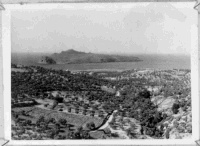 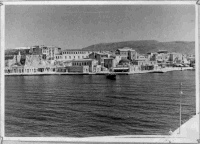 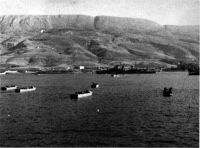 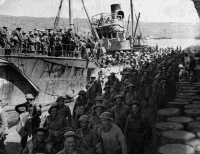 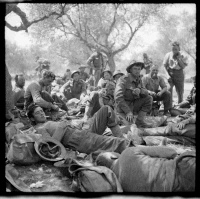 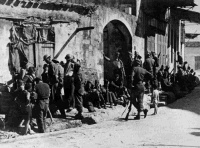 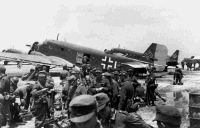 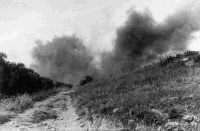 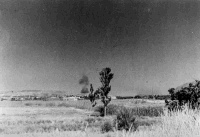 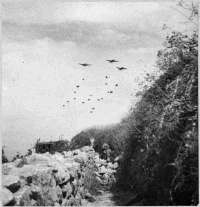 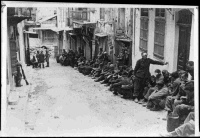 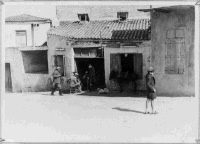 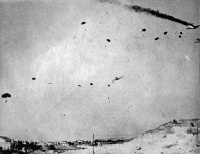 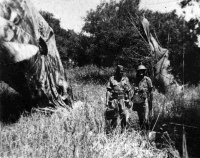 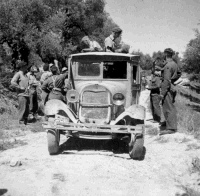 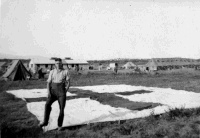 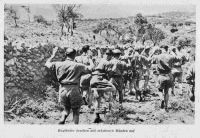 | Most of what was available was antiquated equipment left over from WW1. Ammunition and Petrol was scarce and this had a great impact on the ASC, severely limiting their abilities to make adequate preparations. The shortage of ammunition meant that the infantry units took priority and as a result Tony went to war having fired five shots with a Lee Enfield 303 on the range, one burst of five and three single shots with the Bren gun. While in camp Tony’s lie about his age was discovered. Tony had to obtain written permission from his mother. Tony ended up departing New Zealand with the 4th Reinforcements who were late getting into camp because the 3rd. Echelon was delayed due of an outbreak of measles. In March 1941 they joined the rest of the New Zealand Division and embarked on the ill- fated defence of Greece. The Germans swept through Greece in a matter of weeks and the Allied Forces withdrew after destroying their equipment. Tony ended up on Crete and was incorporated into a composite battalion that consisted of Gunners with no Artillery, Truck Drivers with no trucks and men who were not trained for the kind of Battle that they were about to face. Patrick: The Luftwaffe spent a good couple of weeks softening up Allied positions, how do you remember the intensity of their preparations prior to the Airborne invasion of Crete? Madden: On the morning of the 20th there, it was just on breakfast time. Me and a mate we were on guard duty up on the top, or look out duty. You could hear this great horde of aircraft engines in the distance, coming in, the bloomin place was dark with them. They started off with a whole horde of Messerschmidt fighters, they came up and they strafted up all the valleys and the ridges. The Stukas were with them too, and they bombed everything that they could see in sight. They did that for about half an hour or so. Then it got nice and quiet, and then the troop carriers came in and dropped their paratroopers. From then it was all on. Patrick: Were any paratroopers dropped over the area where you were stationed? Were you close enough to shoot the Germans as they were floating down? Madden: I suppose a lot of them were killed on the way down, there can be no doubt about that. They didn’t actually come down where I was, they were mostly further over towards Maleme and Galatas. There were a few isolated patches. It wasn’t until later that I actually came up against them. Patrick: When was it that you first made contact with the enemy? Did you feel that the training you received prepared you for the close order fighting that occurred during the Battle for Crete? Madden: I’d been given a truck to take some supplies up to Maleme. When I got there they had taken some prisoners that needed to be dealt with. I think there were about four prisoners that had to go down to the prison camp. They gave me a couple of guards and these four prisoners to load into the truck and I took them down to the M.P’s. I was on my way back again and I thought I’d go up into this village, to pick up my guitar, we’d been there before so I knew the village pretty well. I left the truck down in the olive groves at the foot of the village and made my way into the village. I was walking up this street and I saw this chap standing in a doorway. The German uniform was very similar to the Greek Police uniform in as much as their trousers and the colour were the same. The Greek police also carried German Mauser rifles. I wasn’t sure about this fellow, whether he was a Greek policeman or not, so I called out "Hey Greeko" and he came out into the open and it was a blessed German! Well … hells teeth (Ha Ha) he was as surprised as I was you know. I just stood there and looked at him and he stood there and looked at me, I suppose that would be for about three seconds, it may even have been shorter than that but it seemed longer. I’ve got to give him his due, he came to himself quicker than I did, and as soon as he moved I moved too. Then I put into practice the only piece of rifle drill that I ever took. I think it probably saved my life. It’s the action where you’re carrying your rifle in your right hand, and you threw it forward and caught it with your left. At the same time you threw yourself forward and assumed the prone position and you broke your fall with your right arm as you went down. This left you in the position where you were ready to take aim and fire, only my rifle didn’t fire. I went to wor the bolt to put one (bullet) up the spout and the bloody bolt wouldn’t work Then I remembered I was carrying the thing half-cocked because that was the safest way to carry it. I pulled the pin back and it was cocked and I took a shot. He’d already got away a shot at me and missed. I took a shot at him and missed, and I thought "Ahh God" … He fired another shot and I got another one away at him and missed again! His third shot didn't miss, that was the one that got me in the leg! I had my third shot ready to fire and he ducked back into the doorway that he’d came out of. I was just thinking about moving backwards and getting myself out of this situation and a second German appeared in the opposite doorway! He ran across to him and I had a pot shot at him as he went across. I missed him too, as far as I know because it never seemed to make any difference to him. I thought "Well, Hells Teeth, I’d really better get out of here now before I really get into trouble!" I was just working my way, … crawling backwards, towards the corner that I had come around and a third German popped his head up around about ten yards or so further on! He’d been behind a wall! I let one go at him and I missed him too, made him duck though! Then I just threw caution to the wind, got up and ran round the corner and down to my truck. Patrick: Which German hit you? Madden: Hit by the first one. Patrick: How did that feel when you got hit? Did it immobilise you? Madden: Well, it’s just like someone had given your boot a good kick you know! Didn’t hurt at the time, hurt later on that’s when. It was just as though someone had given you a good hefty kick on the boot. Got back up to Maleme, or near enough, and got out of the truck. I couldn’t stand the pain in my leg wouldn't let me stand. The chaps made a cradle, they joined their arms together and made a seat for me to sit in, I put my arms around their shoulders, they carried me up to the RAP (Regimental Aid Post) and that was that. I was bandaged up and put on a stretcher and put down behind a little bit of a hollow, I think I had been given an injection of some sort and somebody had given me a cigarette and I think I went to sleep. They said that I would go down to the hospital ship coming in that night, and that I’d go down and be put on the ship. Night came and went. I woke up the next morning and I was still there! They’d missed me in the dark! From there they took us into Chania and put us into an old building, I think it was a flour mill or something. We were there for maybe six days, and that was pretty harrowing there, there was some pretty close calls with the bombing. Fortunately they never got my building. They bombed that town pretty thoroughly, for about six days we were there. There were some pretty close ones, and I remember the door being blown in at one stage and the place being filled up with dust. There was a dirty great beam, it must have been about 18 inches square, right above me, and I thought "God! this would be lovely if that comes down!" But, fortunately they never got a hit on the building. One night we were taken from there and out round the coast to a little village called Kalyves and we were put down in an olive grove. Patrick: Were you taken prisoner at this point? Madden: No I was taken prisoner the next day and the war just sort of carried on. We’d been put into an olive grove, and just over the road from there was a school that had been taken over by an Australian Medical Unit and it was working as a hospital. In the evening of that day they took us across and put us under the control of the Australian doctor in charge. Patrick: Were you able to walk? How would you describe the conditions at the RAP? Madden: No, I was on my hands and bum as it were. With all the wounded that were coming in there, the place was chocka block.They had erected a great big canvas awning on one side of the building that covered in a courtyard like a lean-to, and thats where they put the stretchers. So that's where I ended up. It must have been about the 27th or so. The next day was fairly quiet, and the Australian doctor and his Orderlies, said that the whole show was pretty well finished, and that they expected to surrender any time. We were told that if we had any German souvenirs or things like that, that we should get rid of them because the Germans would accuse you of robbing the dead. I did have one of those paratroopers’ rings that I handed in, which I had swapped with one of those prisoners that I had had, because he’d had a ring and I liked the look of it, so I thought well, it’s a souvenir I’ll send it home. I didn’t take it off him because I thought I’d make an exchange. I thought I would ask him if I gave him my ring, and he’d swap it for his. That didn’t work out, I didn’t have that souvenir to send home after all because I handed it in. It happened next morning. By this time I’d been getting around by using my hands and my bum, I could move myself that way, and I’d been around the other side of the building and a young German paratrooper came around and had a look, that was it, he just looked at us and went away and that was that. Shortly after that we knew then that we were prisoners, and we were issued little cards to sign. They were pre-printed, it just said that "I am a prisoner of war, I am in good health, I am okay" or words to that effect you know and you signed it and they went to Geneva and then from Geneva they were sent to NZ and from there posted through to our next of kin. And so that was that, I was a prisoner-of-war. Shortly after that we heard that Japan had come in and bombed Pearl Harbour and that America was at war. The only good thing out of that was that it brought America in and we weren’t fighting the war by ourselves. But unfortunately, it also made you worry about your people at home too, because we thought New Zealand was pretty vulnerable. 671 New Zealanders were killed in the Battle for Crete. Another 967 were wounded. Tony was one of 2180 other Kiwis taken prisoner. |